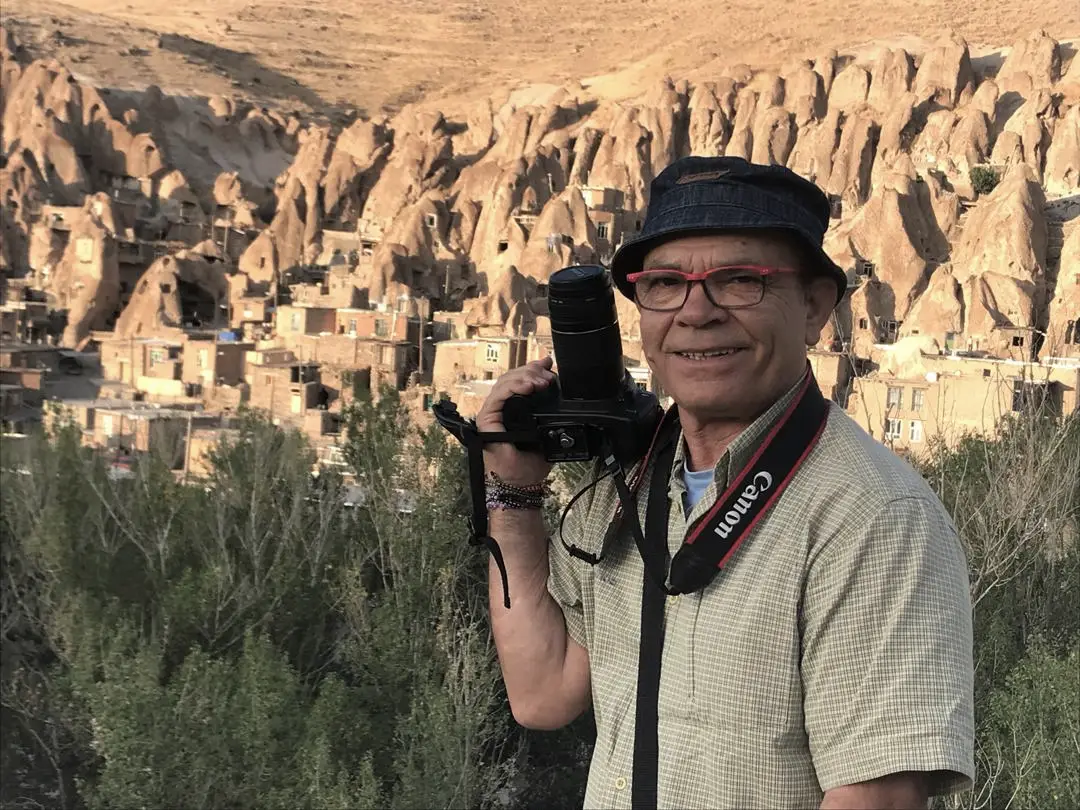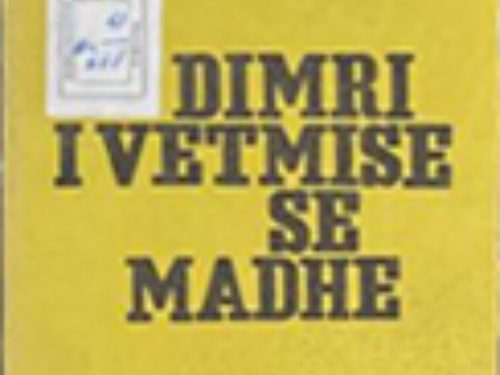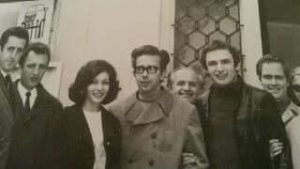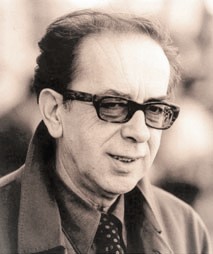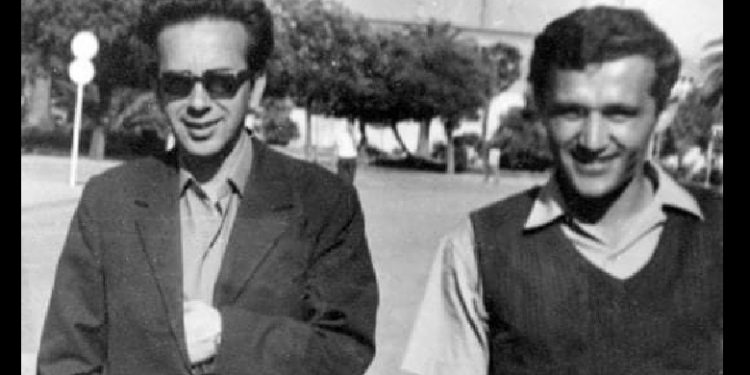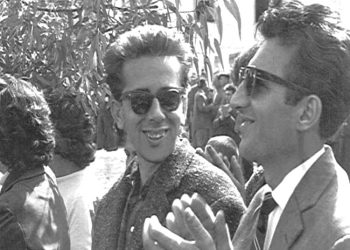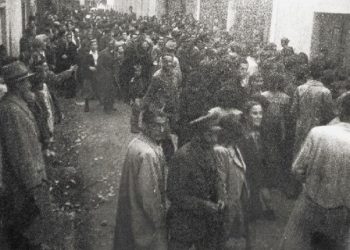By Vasil Qesari
Part sixteen
Memorie.al/ The overthrow of the great totalitarian edifice in Albania would leave behind, not only the change of the system, accompanied by lots of hopes, mirages and cries of happiness but, unfortunately, also many wounds, dramas, victims, dust, milk and disappointments from the most different. Ten years and more after that event, which deeply shook society, completely overturning many previous codes, rules and concepts, people still continue to ask themselves such questions as: What really happened in society Albanian, during the last 50 years of the dictatorship? How was it possible that the system managed to warp everything? Why did people accept it? What was the totalitarian logic of the transformation of society and the individual? How were the structures of totalitarian mechanisms conceived and functioning: propaganda, secret police and the exercise of the ideology of terror? How did it happen that among all the communist countries of Eastern Europe, Albania was considered an exception or a special case? Why did Enver Hoxha remain blindly, fanatically loyal to Stalin until the end, turning the country into a prison where violence, fear and purges continued until the end of the 80s? Why was the country so insanely isolated, locking people up between bunkers and barbed wire? Why, then, did all the above phenomena happen…?! The book “Post-scriptum for Dictatorship” does not claim to provide definitive answers to the above questions, or the complexity of the reasons that brought and maintained the totalitarian power in Albania. Nor is it a complete, deep and comprehensive fresco of the life and suffering that people experienced during that system. Its author, perhaps, has the merit that together with the retrospective view of the totalitarian period as well as the zeal of a passionate analyst, he has tried to turn his head back once again, to give not only his personal memories and opinions, but also to return once again to the vision of that era with the simple philosophy of preserving the Memory and supporting the Appeal to never forget the well-known maxim, that…the corpse’s nails and hair continue to grow even after death! Ten years or more after the great revolution, the book in question has current value and we hope it will be appreciated by the reader because, as an Albanian researcher also says… the greatest evil that can happen to a people comes when he fails to analyze his own past. An amnesic people are forced to be constantly neuropathic and repeat their painful experiences…!
Continues from last issue
ISMAIL KADARE PHENOMENON
Was Ismail Kadare a dissident…? Does it constitute the case of an extraordinary exception, in the circumstances of the absence of a real dissidence in Albania? On the contrary, if he was not a classic dissident of the caliber of Havel, Solzhenitsyn, etc., was he, first, an official writer and then, over the years, a rule-breaker of socialist realism, an anti-conformist, a silent resister, a secret opponent of the regime and, in the end, activist determined against tyranny…?
And, if the answer to the above questions is: Yes!, what would be the scheme of the evolution of the personality and his literary work in the course of the Albanian totalitarian life, from the beginning of the 60s to the end of the years? The 80s? On the other hand, if we were to try to build the scheme of such a path and evolution, would we be able to define completely accurately, the position and role of his creativity in years? (For the very fact that the engagement, evolution and complexity of the world and the work of a writer, in the conditions of totalitarian society, are a complicated, complex, unimaginable and deeply mysterious process).
In my opinion, I say that the scheme, which would characterize and mark the route of the road described by Ismail Kadare in that period, had more or less such a progression: rule breaker – anti conformist – silent resister – opponent secret regime – rival of the dictatorship…! Regarding the objectivity and authenticity of the above scheme, as well as many questions, conjectures and assumptions about the position of the role of Ismail Kadare, as a writer and intellectual during the totalitarian era, opinions, ideas and judgments have been expressed and continue to be expressed from the most diverse. Even to this day, the most contradictory opinions, comments and considerations continue to be written and expressed in the publications, the press and the Albanian and foreign media. Sometimes, full of sympathy and super evaluations, sometimes with sarcasm, gossip and deep hatred.
Such judgments are often so extreme that some manage to describe him as a rhapsody of Enver Hoxha, a singer of the regime, and some others even accuse him of being a diligent collaborator of the dictatorship and its longevity. Others, who represent the overwhelming majority of the opinion, consider him, in addition to being an opponent of socialist realism, also a genius writer, who with his literary work became a Symbol of Hope, Guardian of Memory, Denouncer of Dictatorship, Rival of Totalitarianism, etc. . In general, the smoke about his role, figure and position, according to Kadare himself, has been spread by a certain category of people, who, during the totalitarian era, did not even say half a word about the punishment of injustices and crimes. Of those who took out their revolvers and struck mercilessly against some brave men of culture, and finally, of a category of pseudo-artists who have absolutely no moral right to give lectures, because they have been participants in crimes or enthusiastic and praising observers theirs. Finally, the writer’s definitive and shocking answer to this problem is this:
To sit in the lodge, watching men fight and bleed in the arena, fighting with beasts, and then judging them from above, why one of them was not brave enough in the face of the tiger, and why another one, even, turned his tail, applying a not so correct tactic, this is inhumane! There is nothing to exaggerate, but the fact is that we were in exactly such conditions. Isolated, in an arena full of bloodstains, not knowing from which gate the wild beast would attack us, while most of the spectators, when the moment of the victim’s fall came, sought according to the gesture made by the tyrant, with the finger pointed at us, our death. Here, then, is a macabre and chilling finding, which, perhaps, gives a full answer to the tragic definition of the role of his (lonely) position, in the bloody arena of terror, fear, oppression and totalitarian life itself. However, let’s come back to the main question, with which we started the reflection in question:
Was Ismail Kadareja, a dissident…?!
In the specific conditions of the Albanian Stalinist dictatorship, in my opinion, even though Kadareja traveled a very special and dangerous route (in the narrow paths and Dantesque abysses of the then totalitarian life), he cannot be considered a dissident of a non-existent dissidence. . But, on the other hand, we think that, quite rightly, he deserves to be considered as a very special phenomenon in the history of cultural and artistic resistance of the former communist countries of the East. Someone can say: But, like many writers of those countries, why didn’t he react…?! Let’s also examine this: If, by the way, in the 60s or 70s, Ismail Kadareja would have tried to publish a book against the dictatorship abroad (just as some writers from former communist countries did) East), no doubt that the fate of his life and creativity would have been completely different. After such an allusion, we can rightly judge: What benefit and what change would Albania suffer from such an action? Of course nothing…!
Because, first, at that time, Kadareja was very little known, (not to say unknown), abroad. Secondly, because the international bourgeoisie kept a complete and strange silence, ignoring the fate of Albanians under the Stalinist dictatorship for a long time. While supporting dissident movements in other communist countries such as the Soviet Union, Hungary, Czechoslovakia, Poland, East Germany, etc. Thirdly, in the conditions of isolation and bunkering of Albania, as well as the irrational enthusiasm of the crowds intoxicated by the speeches of Enver Hoxha, the attempts to write real dissident works, would encourage even more the hysteria of violence in the country, not changed and influenced not a bit, in the life of that forgotten corner of the Balkans. Finally, if Kadareja had performed such a heroic act, Albania would have had only one shot or more prisoners in its prisons. Finally, if Kadareja had performed such a heroic act, Albania would have had only one shot or more prisoners in its prisons. (A very Ismail Kadare, a young and talented writer, who had once written an interesting novel, entitled: ‘The general of the dead army’?!).
Yes, cure of cure, an outstanding writer, thus losing, forever, the chance of inheriting a gigantic work of national value. Consequently, with the physical loss or the destruction of the intellect of such a writer, we would not have today that precious treasure of works: novels, novellas, poems, essays, etc., which are not only the pride of Albanian culture, but also of the European one. Kadareja, indeed, cannot be considered a dissident (in terms of the authorship of real anti-communist works, the drafting of manifestos and tracts against the Party of the totalitarian state, suffering and torture in prisons, etc.), but nevertheless, I say that, apart from being the creator of a rare literary universe, he is and remains an outstanding patriot, humanist and democrat, who, with the messages of his work, for decades and under the conditions of an unparalleled dictatorship, directly or indirectly, influenced many aspects of life, culture and spiritual identity of the society and especially the Albanian youth.
(Among others and above all, in keeping our European identity alive against the disfiguring experiments of Eastern totalitarian ideologies, as well as in preserving Hope and defeating the collective fatal Despair. In inspiring Resistance to the Territorial Violence. Consequently, in the fading of Fear and the urge to Courage to action). These were exactly the reasons why, among others, during the student movement and the great anti-communist demonstrations of 1990-1991, people held in their hands the portraits of Fan S. Noli, Ismail Kadare and Rexhep Qose, as symbols of Europeanization, humanity, civilization , the democracy of our true national culture. For characters and creativity of such proportions, such as that of Ismail Kadare, alongside researchers and literary critics of every kind, it is natural to reflect the entire Albanian society and, along with it, the individual and the simple reader. He, who was passionate about it in a discreet, distant way, in the course of the gloomy years of totalitarian life, experienced the Kadare phenomenon as an inseparable part of his memories, soul, emotions, emancipation and cultural formation. As a reference point of Hope that, a day would come when Freedom and Truth would truly become a reality.
January 1970
Getting to know Ismail Kadare, for the students of the last year of the Language – Literature branch, at the Faculty of Philology in Tirana, was a pleasant and completely unexpected occasion. For many of us, it happened in a very special and very depressing situation. It was the time when the experience, methods and style of the Chinese Cultural Revolution, in addition to other areas of life, were being implemented in the structure and curriculum of the Albanian school. Exactly, under such circumstances, a year ago, a new subject was introduced in our programs: Chinese Literature. With the introduction of Asian Marxist culture, other literatures, especially Greco-Roman and European ones, were getting more and more restricted. (Worse still, Chinese literature, although with a thousand-year history and famous authors, in the lectures they gave us was represented only by 36 hymn texts on the revolutionary poems of Mao Zedong, written during the ‘Great March’).
Year 1973
In one of the offices of the local newspaper “Voice of Vlora”, one of its editors came in alarmed and said: Did you find out?! He, Kadareja, has published a bunch of books. You want to vomit when you read it. I heard that, not only the leadership here, but also above, they did not receive him well at all…! Ismail Kadare’s novel, ‘Winter of great loneliness’, went on sale a few days ago in the only bookstore in the city and was sold out within 30 minutes. That book had been talked about for a long time and many readers had been waiting for it. Initially, in the press, no comment was made about the novel. Only after a month, suddenly, on the third page of the newspaper “Voice of Youth” a letter was published, which questioned the ideological values of the novel. Yes, the work did not end there. Then, not only in that newspaper, but also in others, messages, pronouncements and letters sent by soldiers, cooperators, students, police and veterans began to be published, in which the novel was considered anti-socialist and, its author, with influences revisionist. The buzz around the novel was getting bigger and bigger. From factories, schools, military units, cooperatives, associations and various organizations, letters and telegrams were sent to the Central Committee of the Party, through which they expressed their indignation at the novel and the author who had blackened the socialist reality. (In some collectives, Kadare’s arrest was even demanded). While, at a meeting of veterans in Vlora, a former guerrilla of the National Liberation War had declared:
“…Boll with the traitor Kadare…”! He should be arrested on the spot. Even, he should have been put in prison a long time ago and, I am surprised and do not understand why, our Party is so tolerant with such an enemy!
The anti-Kadare campaign, instigated by the most fanatical militants, had become a national issue and the discussion about the novel ‘The Winter of Great Solitude’, the topic of the day. One morning, at the buffet of the Party Committee in Vlora, the head of the Department of Internal Affairs, H.U. ordered a coffee and then, talking to an instructor in the Education sector, developed the following dialogue:
– Did you read Kadare’s new novel?
– I haven’t finished it yet. I’m there from the beginning…!
– I finished it and, after reading, I reflected a lot. I say that the author of that novel is a very dangerous element. For the ideals of the Party, if I had him here in front of me, I would have thrown the bars immediately…!
– Okay! You are right. He is an enemy – asserted the other.
The above conversation took place in high tones and, after a while, four or five other instructors gathered around the Head of the Branch. He puffed up even more and continued, but now in a lower voice: They told me on the phone from Tirana that our minister (Kadri Hazbiu) started to read the book, but left it in the middle. In a meeting with State Security staff, he had said: I read 40 pages of the novel and spat on them 40 times! Kadare’s arrest was expected from day to day. Some, (who, unfortunately, were few), were waiting for this with pain and a sense of disaster. The others, (who again, unfortunately, were many), awaited the news with a great sense of joy and, what was even more cynical, as a victory over the intellectuals, who, as the Party had often emphasized , were the most likely layer to be affected by foreign influences…!
But, despite all the demands, insistence and pressure of the militant communists from the grassroots to the top in the leadership, this was not happening. Meanwhile, the public opinion, even though about three months had passed full of noise and comments about its author’s novel, continued to wait for the news of the writer’s conviction. Debates and questions, whether Kadareja would be hit or not, at that time turned into a cynical curiosity, one of the most common. In the meantime, something seemed unusual and evoked a strange feeling of surprise: Why was the Party, this time, delaying the sentencing? Why did he hesitate, while other times, the enemies had received the punishment directly without mercy…? Despite all the impatience, the writer’s many enemies consoled themselves by thinking that it was better late than never. They anxiously awaited the word of the Great One, His decision.
During a visit of Enver Hoxha to the Elbasan Metallurgical Plant, among other things, he was asked the long-awaited question for which the whole country was buzzing: Comrade Enver, why are no measures being taken against the author, while the novel is facing massive opposition? Enver Hoxha’s answer was intelligent, subtle, and diabolical. He had said that he had read the novel and that he was aware of the debates and concerns that it had aroused in the masses. But… two things had to be understood: the first is that: “writers are not like us”. They are intellectuals. Their ideas are confusing. They use metaphors. In short, they fly in the clouds‚ they are not clear in their thoughts like us, the communists. And, besides, what would the Soviets say, if we will take measures against the author? They will say that their power is so great that despite the fact that the book contains attacks against them, we are forced to punish its author. They will say: Do you see how much they love us in Albania? Here’s why, we have to look deeper into this problem and fix it calmly.
For the first time in his life, the all-powerful Enver was embarrassed and forced to give public explanations. For the first time, the executioner was hesitant and forced to protect the victim, whose head was in front of his eyes, the thin blade of the caramanjolla…! Why? Enver Hoxha was the central character of the novel. So, with all the reservations, criticisms and ferocity of the militants for the “deformation” of the socialist reality, the book that portrayed him – (as an international leader of the fight against revisionism) – could not be stopped. Enver Hoxha reflected and thought that by doing so, the benefit was greater than if the opposite happened. Later, he would even allow the novel to be published in the West! After that, the scary situation seemed to be over. Ismail Kadareja miraculously escaped the fatal punishment. Already “winter of great loneliness”, with the figure of Enver Hoxha in the center, has turned into a protective talisman for him. But this situation was not meant to last long. Another similar situation would be repeated two years later. Memorie.al
The next issue follows





